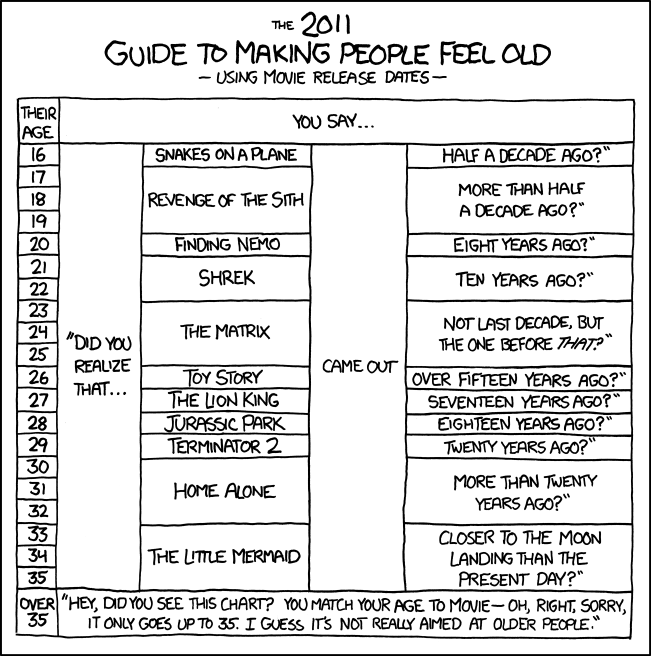Time binding: The human ability to pass information and knowledge between generations at an accelerating rate. Korzybski claimed this to be a unique capacity, separating us from other animals. Animals pass knowledge, but not at an exponential rate, that is to say, each generation of animals does things pretty much in the same way as the previous generation. For example, at one time most human societies were hunter-gatherers, but now more advanced means of food production (growing, raising, or buying) predominate. Excepting some insects (for example, ants), all other animals are still hunter-gatherer species, even though many have existed longer than the human species.Source
Among the people to work with the concept of time binding are Marshal McLuhan and Robert Anton Wilson.
One of the fundamental results of time binding (and the source of the term) is that when you record information in this way, you lower the amount of distortion done to it by natural processes over a given span of time. By doing this, you make that particular piece of information more available to people in the future (or available to people further in the future). Because of the availability bias, information that is more familiar seems to some extent more current, in the sense of seeming more (currently) true. So, time binding, though it does not slow down time, slows down time perception of the past, creating a mental 'now' that extends further into the past. This makes rear view mirror thinking not only easier to do but easier to get away with.
Among the many things the widespread adoption of the internet has done for us is made a significantly greater quantity of significantly more trivial information significantly more available to a significantly greater quantity of people significantly less familiar with the subject matter. The widespread adoption of the internet has also made it easier for people like the archive team to save information that would have otherwise been lost. So, in other words, someone living in a bubble on Mars in 2525 can read the tweet you sent yesterday about what you were having for breakfast. Because of time binding, that tweet will seem significantly less old to that Martian bubble-boy than anything written in 1476 will seem to you.
Nearly everyone born in the industrialized west in the twentieth century, aside from the very poor and those living in anomalously technically retrogressive communities, is not only intimately familiar with but is involved with the franchise of some media created shortly before their own birth. There are many Star Wars fans who weren't born until after the last episode of the original trilogy was released, and probably some who weren't born until all of the current canon films were released. There are even more fans of the Lord of the Rings trilogy who were not alive when they appeared in paperback, let alone when they were written. Some classic rock fans who lived through the latter end of the era (and were actively consuming the release of, say, Pink Floyd's The Final Cut) were not alive for the early releases (such as Pink Floyd's Atom Heart Mother). Does The Final Cut sound old? Does The Empire Strikes Back feel like an old film? Neuromancer was written six years before I was born, but it still feels fresh. A piece of media feeling old has never had to do with its actual age; it has always been the gradual decay of information about it. With the increase in storage space, communications speed, and fidelity, we slowly extend our 'now' behind us in time, like a comet's tail.
























What of language? Why do we have a natural disposition to it? How did that arise? Can other ideas actually shape the brain into a format that receives them more readily?
ReplyDelete